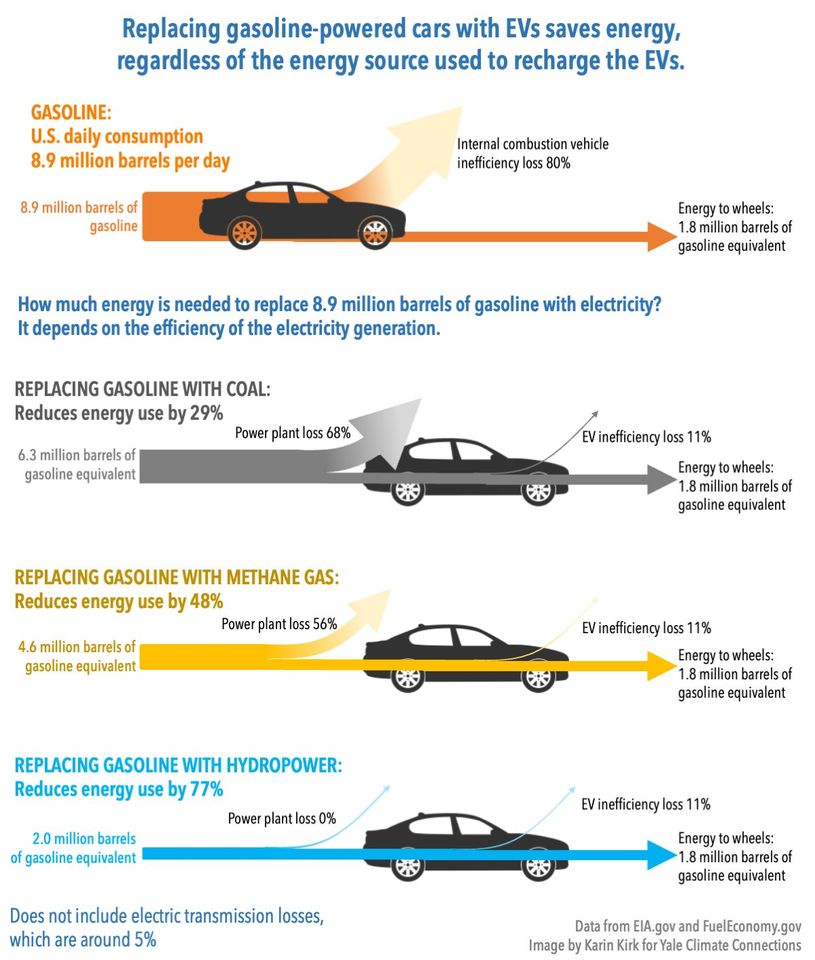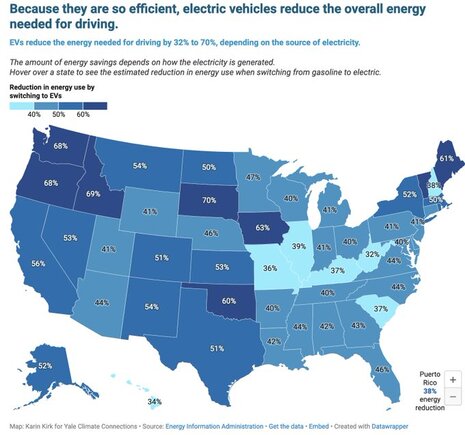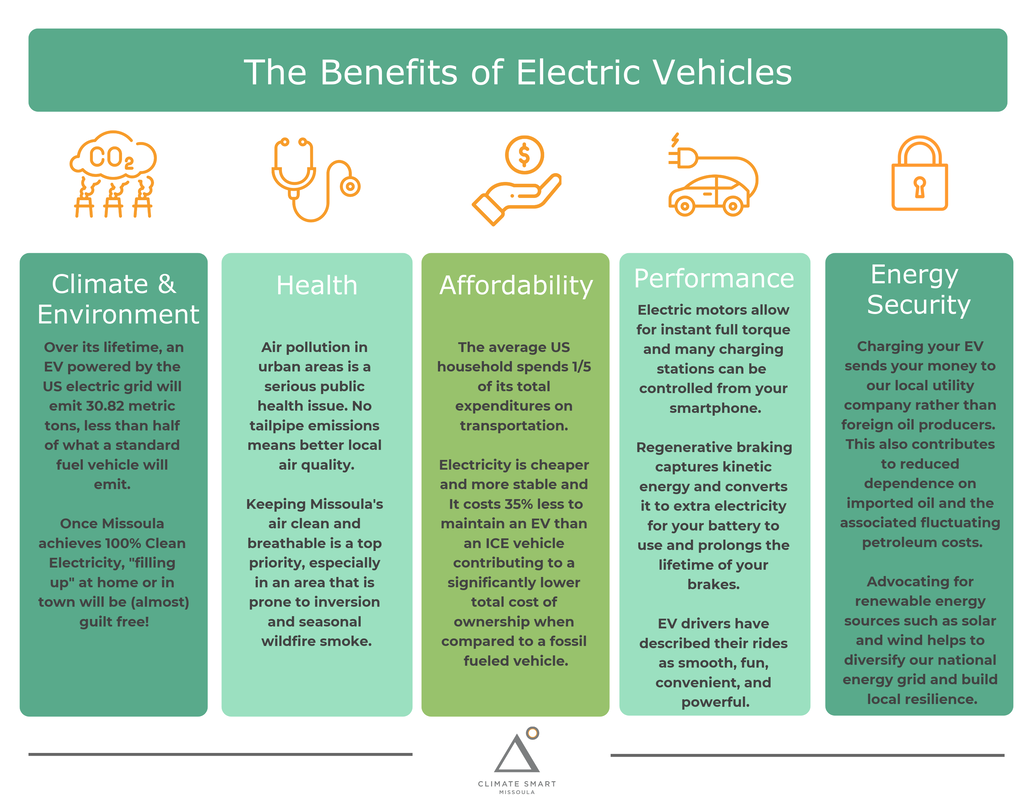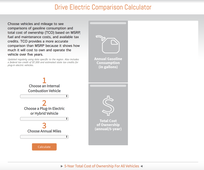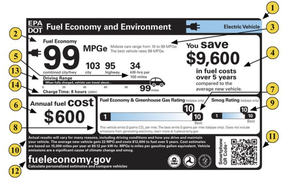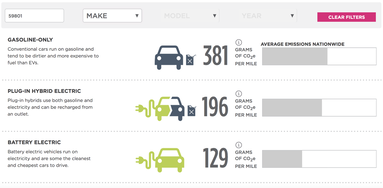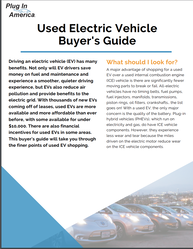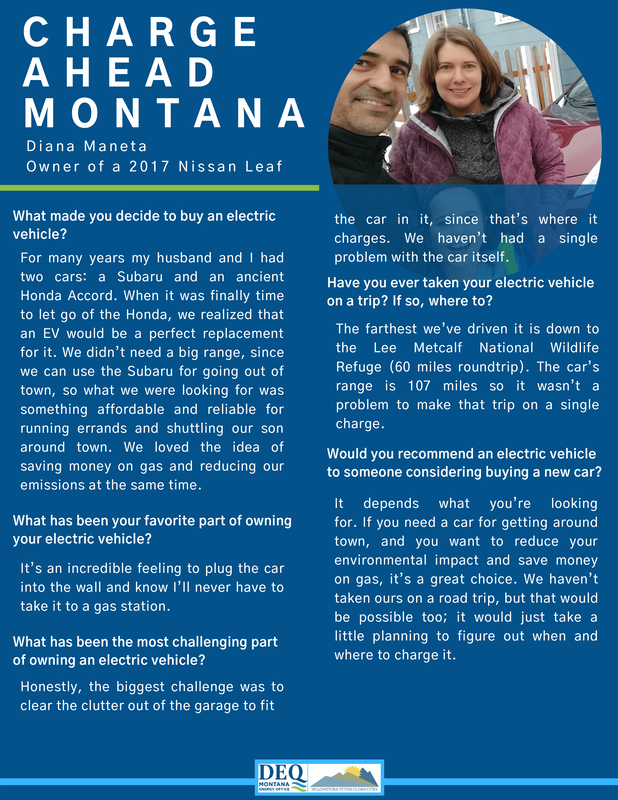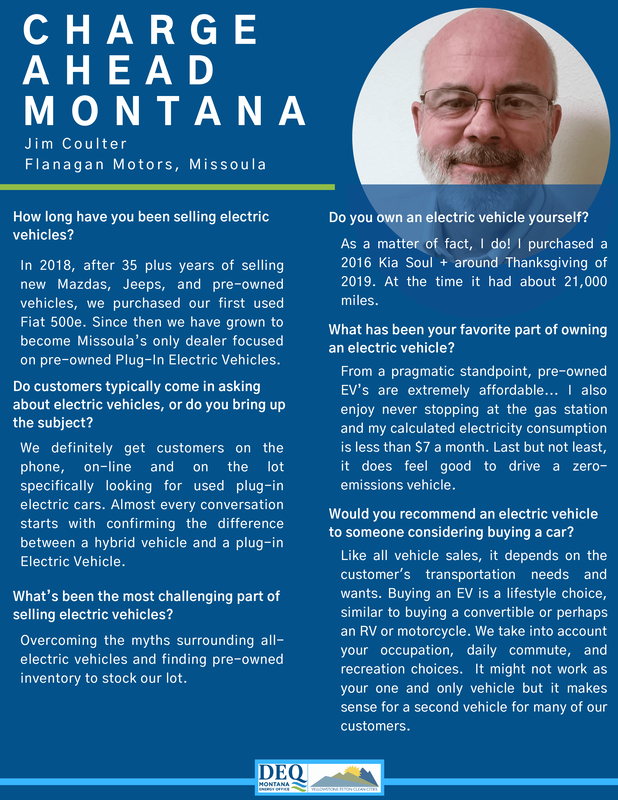This page is your resource for everything EVs - why they matter, how they work, what to look for, where to charge them, & more.
And did you know: EVs are definitely cleaner than gas cars over their lifetime (Canary Media 3-15-2024)
And did you know: EVs are definitely cleaner than gas cars over their lifetime (Canary Media 3-15-2024)
|
Electric Vehicles in Missoula
We also know that people often need to drive. With that in mind, a primary way to reduce emissions is to drive an EV. Electrifying Transportation is a key component of our primary climate solution: electrify everything and power the grid with 100% clean energy. Gasoline will forever be 100% fossil fuel! The EV field is changing fast, with more affordable models, longer range between charges, more charging stations. We also know there is so much work to be done to ensure the quick transition to all electric considers equity and is not just for those who can make the switch. We need incentives, rebates, charging infrastructure for apartment dwellers and renters. |
Tax Credits for EV's in 2024
Excitingly, the Inflation Reduction Act offers tax credits for new and used EVs. Guidelines for EV Tax Credit Instant Rebate - The Treasury Dept. issued guidelines for consumers to take advantage of the federal EV tax credit as an instant rebate at the dealership rather than receiving it as a credit when filing taxes the following year. Nice! Check fueleconomy.gov to see which vehicles are eligible for the credit. Great info all compiled in 2024: Plug In America. There's updated and great info on buying new and used EVs for home and business at this IRS webpage. |
There's a lot to know about the efficiency of EVs (and lots of myths).
We love these 2 infographics from Yale Climate Connections and Karin Kirk.
Learn more about EVs
- Missoula Current: Missoula still eyeing EV charging network
- GRIST: These 7 factors are driving the switch to EVs
- DriveElectric.gov: The federal government site for where our EV infrastructure is headed. A wealth of information!
- Batteries - essential to EVs. A great podcast on all things batteries from the Catalyst: The big rush for battery metals.
WHAT IS AN ELECTRIC VEHICLE?
|
An electric vehicle (EV) is any vehicle that is powered by electricity derived from a power plug.
A battery electric vehicle (BEV) or all electric vehicle (AEV) is an electric vehicle that drives solely on power from a plug. A plug-in electric hybrid (PHEV) is a vehicle that can run on both electricity and gasoline. They typically run first on electricity and then draw on gasoline to supplement the ride when the electric power runs out. |
HOW DO ELECTRIC VEHICLES WORK?
Engine
Instead of an internal combustion engine (ICE), an EV relies on an electric motor combined with a large battery pack. The batteries are charged by plugging the vehicle into an outlet or charging station.
Fuel Economy
Just as miles per gallon (mpg) tells you how many miles your vehicle can travel on one gallon of gas, MPGe tells you how many miles per gallon your electric vehicle would get if it were fueled with gasoline. This equivalent is often seen on electric vehicle labels and is typically around 100MPGe.
An egallon is another way to compare fueling costs that is expressed as the cost of fueling a vehicle with electricity compared to a similar vehicle that is fueled with gasoline.
kWh/100 miles is a standard measure of your fuel consumption rate. It tells you how many much energy your vehicle uses to travel 100 miles. This figure relates directly to the amount of electricity used to power your vehicle and is therefore indicative of efficiency and fueling cost.
Charging
Level 1 Charger: your EV will come with a plug that is compatible with a standard 120V household wall outlet. This is a great option for overnight charging. Your EV will gain 3-5 miles of driving range for every hour it is plugged in.
Level 2 Charger: These are typically installed in public charging stations or private office buildings. Using a 240 volt circuit, every hour your EV is charging will add 10-25 miles of driving range. Your vehicle will be fully charged overnight.
DC Quick-Charge: This is the fastest charging circuit and is only available at commercial locations. Depending on the charger and vehicle combination your EV will gain anywhere from 65-130 miles of driving range in 20-30 minutes.
Driving Range
Driving range varies between models and is dependent on the vehicle's battery quality and efficiency. Most can travel 100 miles on a full charge, with other models traveling up to 300 miles on a single charge.
Instead of an internal combustion engine (ICE), an EV relies on an electric motor combined with a large battery pack. The batteries are charged by plugging the vehicle into an outlet or charging station.
Fuel Economy
Just as miles per gallon (mpg) tells you how many miles your vehicle can travel on one gallon of gas, MPGe tells you how many miles per gallon your electric vehicle would get if it were fueled with gasoline. This equivalent is often seen on electric vehicle labels and is typically around 100MPGe.
An egallon is another way to compare fueling costs that is expressed as the cost of fueling a vehicle with electricity compared to a similar vehicle that is fueled with gasoline.
kWh/100 miles is a standard measure of your fuel consumption rate. It tells you how many much energy your vehicle uses to travel 100 miles. This figure relates directly to the amount of electricity used to power your vehicle and is therefore indicative of efficiency and fueling cost.
Charging
Level 1 Charger: your EV will come with a plug that is compatible with a standard 120V household wall outlet. This is a great option for overnight charging. Your EV will gain 3-5 miles of driving range for every hour it is plugged in.
Level 2 Charger: These are typically installed in public charging stations or private office buildings. Using a 240 volt circuit, every hour your EV is charging will add 10-25 miles of driving range. Your vehicle will be fully charged overnight.
DC Quick-Charge: This is the fastest charging circuit and is only available at commercial locations. Depending on the charger and vehicle combination your EV will gain anywhere from 65-130 miles of driving range in 20-30 minutes.
Driving Range
Driving range varies between models and is dependent on the vehicle's battery quality and efficiency. Most can travel 100 miles on a full charge, with other models traveling up to 300 miles on a single charge.
WHAT TO CONSIDER WHEN BUYING AN ELECTRIC VEHICLE
EVs are a viable option for most lifestyles and budgets. There are more than 50 models commercially available and over 1 million Americans are now driving electric vehicles. If you're used to driving a conventional gasoline powered car then there are a few important factors to consider when shopping for an EV.
We're currently looking into who sells EVs in or around Missoula so stay-tuned. We do know that Flanagan Motors is working to bring as many pre-owned EVs to Missoula as they can and they host lots of great information together with their current fleet HERE.
We're currently looking into who sells EVs in or around Missoula so stay-tuned. We do know that Flanagan Motors is working to bring as many pre-owned EVs to Missoula as they can and they host lots of great information together with their current fleet HERE.
Cost
|
EVs can be more expensive upfront than their ICE counterparts, but when you consider fuel prices, available tax incentives, and your total cost of ownership (TCO), an EV will save you money.
Click here to take a look at the existing federal tax incentives for each EV model |
fuel economy and efficiency
|
It is important to understand the difference between MPGe and kWh/100 miles. kWh/100 miles is representative of your vehicle's efficiency and a lower number of kWh/100 miles means your EV uses less energy to travel 100 miles and is more efficient. This also means it will cost less to fuel your EV.
|
Emissions Potential
|
Not all EVs are created equal! Efficiency and weight, not just electric vs gas, also significantly affect a vehicle's climate impact. If you're deciding between a few models, visit GreenerCars to see how they stack up compared to others on the market today, and use the tool at the right to calculate emissions potentials to ensure your vehicle will have the lowest environmental impact.
|
Used vs. new
|
This will affect the price of your vehicle as well as your environmental impact. A new EV will have a higher upfront cost and buying used reduces the industry's overall emissions associated with production. Used EVs are an especially great budget and environmentally friendly option.
|
There are probably more EVs in Montana than you realize!
See how these Missoulians feel about their EVs and get to know what other Montanans think here
See how these Missoulians feel about their EVs and get to know what other Montanans think here
CHARGE YOUR RIDE MONTANA
Government, non-profit, and for-profit entities are eligible to apply for EV charging infrastructure funding through the Montana Department of Environmental Quality. Application deadlines are May 18 and August 31. Visit the DEQ site for more information.
Government, non-profit, and for-profit entities are eligible to apply for EV charging infrastructure funding through the Montana Department of Environmental Quality. Application deadlines are May 18 and August 31. Visit the DEQ site for more information.
NATIONAL CHARGING STATION MAP
Below is a National Fueling Station Map provided by the US Department of Energy Alternative Fuels Data Center. Use this tool to plan a trip or find nearby charging stations by entering different locations and selecting "Electric" as your fuel type.
Loading alternative fueling station locator...

